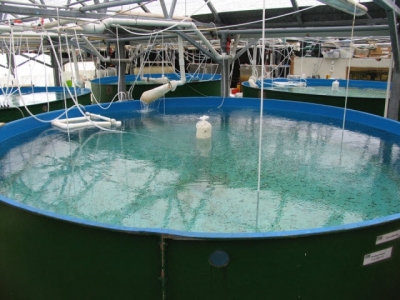Tropical, subtropical marine fish hatchery technology needs improvement
Anybody working with hatchery technology and the larviculture production of tropical and subtropical marine fish species knows too well that the devil is in the
 Prebiotics and their role in sustainable aquaculture
Prebiotics and their role in sustainable aquaculture The aquaculture industry’s promising future will not come without challenges. Sustainability will accompany the goal of long-term profitability.
 Developments in closed-containment technologies for salmonids, part 2
Developments in closed-containment technologies for salmonids, part 2 The first half of the second day of the conference highlighted research efforts to improve our understanding of trout and salmon production in closed-containmen
 Tilapia trial aimed at setting parameters for medicated feed
Tilapia trial aimed at setting parameters for medicated feed Tilapia given the medicated feed additive, sulfamethazine, may need a 10-day withdrawal window to ensure safe residue levels, say researchers.
 Developments in closed-containment technologies for salmonids, part 1
Developments in closed-containment technologies for salmonids, part 1 The past five years have created a near-perfect storm of circumstances that has encouraged industry improvements and interest in closed-containment systems.
 What does the salmon net pen of the future look like?
What does the salmon net pen of the future look like? In the near-to-mid-term, it seems likely that salmon farming will continue to be chiefly based in the coastal areas it has traditionally inhabited.
 Yeast, plant extracts may support farmed salmon in stress
Yeast, plant extracts may support farmed salmon in stress Adding yeast or plant extracts to salmon feed may improve fish responses during stressful periods, say researchers.
 Does a spoonful of fish feed help the medicine go down?
Does a spoonful of fish feed help the medicine go down? DNA-supplemented feed may offer an efficient method of mass vaccination for farmed Atlantic salmon facing disease challenges, say researchers.
 Biofloc technology holds potential for carnivorous fish species
Biofloc technology holds potential for carnivorous fish species Biofloc technology is a water quality management strategy that requires adding a carbon source – such as sugars, glycerol or complex carbohydrates
 Dietary curcumin may boost fish survival, performance in disease challenge
Dietary curcumin may boost fish survival, performance in disease challenge Farmed fish facing a bacterial challenge may see a survival and performance support from feed supplemented with curcumin, say researchers.'
 Mercury feed contamination may affect feed intake in fish
Mercury feed contamination may affect feed intake in fish Fish experiencing mercury contamination may see short-term changes in feeding behavior and longer-term biochemical alterations, say researchers.
 What to do with empty big box stores? Turn them into fish farms
What to do with empty big box stores? Turn them into fish farms Aquaculture can do more than just produce fish for market. It can also be a force for positive social change in parts of the world where economic growth
 Aloe vera supplementation may boost immune function in farmed fish
Aloe vera supplementation may boost immune function in farmed fish Farmed pacu facing disease and stress challenges may see immune and production benefits from feeds supplemented with aloe vera, say researchers.
 Evaluating effects of organic acids in Nile tilapia feed
Evaluating effects of organic acids in Nile tilapia feed Farmed tilapias contribute prominently to global seafood supplies, with sustained and increasing annual production in many countries around the world.
 Evaluating dietary fish oil replacement in juvenile Florida pompano
Evaluating dietary fish oil replacement in juvenile Florida pompano Several ingredients are used in the aquafeed industry, but proteins and lipids of marine origin (i.e., fish meal and oil) are considered some of the most import
 Evaluating excess supplementation in tilapia diets
Evaluating excess supplementation in tilapia diets Tilapias are widely cultured in the tropical and subtropical regions of the world. They are the most diversified species geographically
 Advice for managing predatory birds, part 2
Advice for managing predatory birds, part 2 Scaring or frightening methods to control piscivorous species of birds use sight and/or sound stimuli to discourage birds from remaining at a site
 Advice for managing predatory birds, part 1
Advice for managing predatory birds, part 1 Several species of predatory birds can cause substantial fish losses in commercial tilapia farms, but because some bird species are protected by law
 Breeding for faster-growing bluegills, yellow perch
Breeding for faster-growing bluegills, yellow perch Inside tanks filled with cool water in southern Ohio are female yellow perch mating with other female yellow perch and male bluegills with other male bluegills
 Fish genome sequenced with big data
Fish genome sequenced with big data Annotated genome of California yellowtail could be first step in its sustainable aquaculture harvest.
